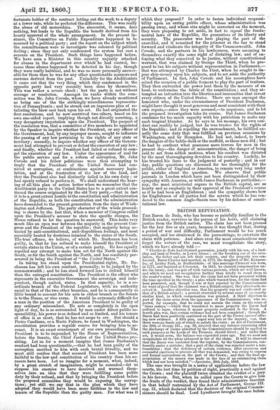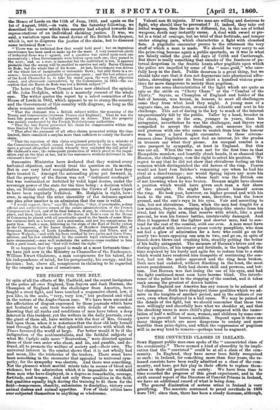BRITISH REPUDIATION.
THE Baron de Bode, who has become so painfully familiar to the British reader, survives in the person of his heirs, still claiming justice from the British nation. The claim has not been pressed for the last five or six years, because it was thought that, during a period of war and difficulty, Parliament would be too much occupied, and too straitened in the pursestrings, to entertain the claim with patience. And since even the most conscientious may forget the nature of the case, we must recapitulate the story, which we have already told :— "Charles de Bode had obtained possession, jointly with his son, of a lord- ship and land of Soultz, in Lower Alsace; on the breaking out of the revo- lution, the father and son left their country, and the property was con- fiscated. Baron Charles had married, in 1775, the daughter of Mr. Kynners- ley, of Loxley Park, in Staffordshire : of this marriage Clement was born, in 1777, and baptized at Uttoxeter. In 1815, he claimed compensation un- der the treaty, and was put off with various pretexts, which are well known, and which we need not recapitulate further than briefly to recall them to the reader's mind. One was, that the claim had not been presented within the time specified in the treaty ; a plea which was not true, for the claim had been presented, and, though it was at first rejected by the Commissioners for want of proof that the claimant was a British subject, they afterwards re- ceived it. Another objection was, that his property was not confiscated as that of a British subject ; a pretext overruled by several cases of an exactly similar kind, in which compensation was granted. A third objection to part of the claim arose from the ignorance of the Commissioners, who re- ported, for example, that he could not sustain the claim on the score of • biens cadues,'—which they translated to mean property the Baron had suffered to lapse, whereas it meant property escheated to the Baron. A fourth plea was, that certain evidence had not been completed ; though the Baron had been positively cautioned on the part of the Crown again.re offer- ing new evidence. A fifth plea, urged very late in the inquiry, was, that there were no funds out of which to satisfy the claim : an Act of 1?arliament, the 59th of George III., cap. 39, directed that any balance remaining after the discharge of claims admitted by the Commissioners should be applied to such purposes as the Lords of the Treasury should direct ; and under that act, it would seem, the balance was expended years ego. But we need not recapitulate all the pleas advanced in bar of the claim. It will be observed that the Baron was excluded from the register, by the Commissioners, con- fessedly under a mistake ; that a part of the claim was rejected under a mis- translation; that the deficiency of certain evidence, after enormous and successful exertions to procure all that was demanded, was owing to express and formal instructions on the part of the Crown ; and that the final ap- propriation of the money was made in the face of an outstanding claim which had not been satisfied."—Spectater, 30th July, 1863.
The ease was brought in a series of applications before the law courts, the last time by petition of right, practically a suit against the Crown ; and the plaintiff twice obtained the verdict of a jury in his favour. But, when he called upon the Courts to give hini
the fruits of the verdict, they found their administrative function in that behalf restrained by the Act of Parliament, George Ill. cap. 31, which declared that the decision of the.original Commis- sioners should be final. Lord Lyndhurst brought the case before
the House of Lords on the 11th of June, 18.52, and again on the 1st of August, 1853,—in vain. On the Saturday following, we described the course which this country had adopted towards the representatives of an individual claiming justice. It was, we said, a 'variation upon the usual device of the British Exchequer, which is, not to disprove the justice of the claim, but to discover some technical flaw
There was no technical flaw that would hold good ; but an ingenious contrivance has been used to make no for the want. A very numerous circle of technical flaws was it;agined, and a question was raised upon each one successively ; when Governments were beaten upon each one, they passed to the next.; and, as a state is immortal but the Individual is not, it appears probable that the wrong will be enabled to survive not only Baron Clement de Bode, but the whole line of his house. At last, Government was driven off the whole list of imaginable or untenable flaws ; but still there is a re- source : Government is positively beginning again; and the last solemn act of the Lord Chancellor is, to take his stand upon the very first objection raised, and afterwards surrendered, by the Commission in 1815—the ex- ception that the Baron de Bode was not a British subject !"
The heirs of the Baron Clement have now obtained the opinion of Mr. John Hodgkin, which is a masterly resume of the whole ease. The writer quotes the report by a select committee of the House of Lords in 1852, which appears to us to stamp the oountry and the Government of this country with disgrace, so long as the claim remains unsatisfied.
"That the claimant was a British subject within the meaning of the Treaty and Conventions [between France and England]. That he was the bona fide possessor of a valuable property in Alsace. That the property was unduly confiscated by the French Revolutionary authorities. "That the late Baron presented his claim for compensation within the time limited by the Convention. "That after the payment of all other claims presented within the time limited, there remained a surplus more than sufficient to satisfy the Baron's claim.
"That the rejection of this claim originated principally in a mistake of the Commissioners, which caused them prematurely to close the inquiry, upon a ground altogether invalid, whereby they excluded the fall proof of the claimant's ease, the subsequent production of which proof at the inqui- sition and on the trial at bar, IW to the successive verdicts delivered in the claimant's favour."
Successive Ministries have declared that they waived every technical objection, and would treat the question on ita merits. But in our very brief recapitulation we have stated how they have treated it. Amongst the astounding pleas put forward, is, that the property of the Baron was not " indfiment confisque " but was confiscated or forfeited by valid legal decree, under the sovereign power of the state for the time being ; a decision which also, on British authority, pronounces the Crown of Louis Capet to have been regularly forfeited., Mr. Hodgkin. is right, how- ever, in saying that the utter absurdity of the defences against one plea after another is an admission that the case is valid.
"1 would suggest, then," says Mr. Hodgkin, "that, if practicable, a clear official and authoritative return of the entire administration of the French Compensation Fund, and of its final balance, if any, be obtained in the first place, and then, that the conduct of the Baron de Bode's case in the House of Commons be placed with all practicable speed in the hands of some Mem- ber eminent both as a lawyer and a statesman, and not too conspicuous for party bias. Such a man, following in the steps of the Earl of Derby (when in the Commons), of Sir James Graham, of Matthew Davenport Hill, of Sergeant Manning, of Lords Lyndhurst, Brougham, and Truro, and of Spencer Walpole,—and with his facts verified by two juries and three Com- mittees, and his law established by the eminent legal authorities whom I have enumerated,—may well undertake the arduous cause confided to him with a good heart, and say God will defend the right.' " It so happens that the appeal is made at a most fortunate time we have just now in the Ministry as Chancellor of the Exchequer, William Ewart Gladstone, a man conspicuous for his talent, for his independence of mind, for his perspicacity, his energy, and his decision ; but, above all, conspicuous in claiming to be regarded by the country as a man of conscience.



























 Previous page
Previous page